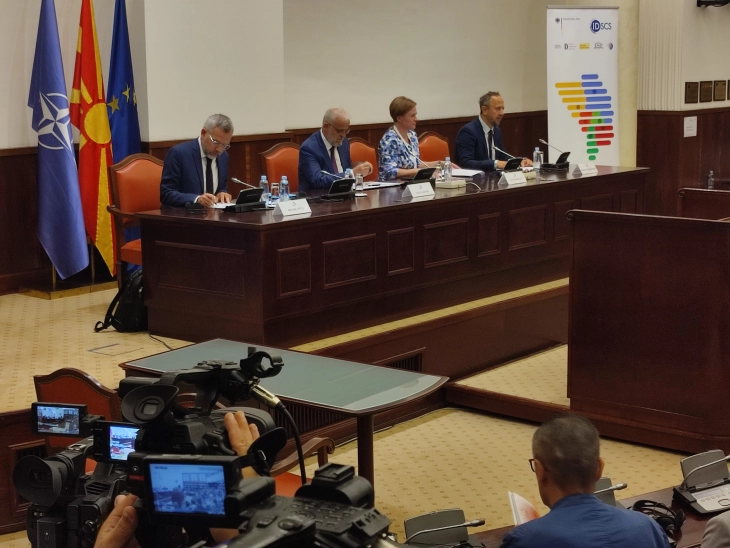Xhaferi: Parliamentary democracy may prove crucial to solving open issues
- Parliamentary diplomacy, through dialogue between lawmakers, may prove crucial to solving complex problems including open issues and conflicts, Parliament Speaker Talat Xhaferi said in his address to a conference on advancing the Berlin Process through parliamentary diplomacy being held in Parliament on Sept 12–13.

Skopje, 12 September 2023 (MIA) — Parliamentary diplomacy, through dialogue between lawmakers, may prove crucial to solving complex problems including open issues and conflicts, Parliament Speaker Talat Xhaferi said in his address to a conference on advancing the Berlin Process through parliamentary diplomacy being held in Parliament on Sept 12–13.
According to Xhaferi, parliamentary diplomacy offered a unique opportunity to build bridges between countries and Members of Parliaments belonging to different cultures and traditions, ultimately "creating synergies in relation to strategic issues of common interest."
"The Berlin Process encompasses reconciliation, European integration, greater mutual regional connection of the countries of the Western Balkans, overcoming open issues, greater cooperation between young people, civil society and the business community as well as support from other European countries participating in this process and their commitment to bringing the region closer to full EU membership," Xhaferi said.
Over the past decade, he added, the Berlin Process produced successful results, including agreements and multilateral projects. However, parliamentary dialogue was still lacking, Xhaferi noted, recalling the 2019 Poznań Summit, which stressed the need of strengthening the parliamentary aspect of the process and of a greater involvement of members of the public in this dialogue.
He said increasing regional parliamentary cooperation and cooperation with EU member states' parliaments and the European Parliament could significantly contribute to the exchange of ideas and experiences and improve the legislation resulting from agreements signed as part of the Berlin Process. Also, he added, it could increase the Parliament's supervisory role in the implementation of the adoped legislation.
"Geographically, strategically and with the majority approval of the public, as a region, we are predisposed to become EU members as soon as we meet the necessary requirements," Xhaferi said, adding that various challenges lay ahead nevertheless.
"We have to tackle and find acceptable solutions for all open issues that obstruct us on this path. Our societies need an ultimate reconciliation and real projects in the areas detected by the European Commission," he said, also noting that "the orchestrated influence of third parties in the entire region is of particular concern."
"We have to accept it, whether we like it or not: as Balkan states, we share the same challenges and problems, but also the same future," Xhaferi said.

Institute of Democracy president Marko Troshanovski said the conference was the beginning of an informal partnership between regional parliaments and non-governmental organizations. He said they would be working together toward a better implementation of Berlin Process obligations and toward greater NGO involvement in the process.
According to Troshanovski, the debate on enlargement was of existential importance for the future of the Western Balkans and so was the implementation of Berlin Process committments.
The Poznań Summit, he said, recognized the importance of parliaments as platforms for engaging in the Berlin Process "which brings benefits not only in reducing roaming costs, but also has other benefits that people are unaware of."
"This is why we decided to work together with non-governmental organizations, parliamentary staff and MPs in the next two years to achieve the ambitions of the Berlin Process. We will work on agreements on facilitated mobility, the common market, and the green agenda," Troshanovski said.
German Ambassador Petra Drexler said lawmakers knew the wishes and needs of the public best because they were close to them.
"Regional cooperation is based on meetings between people and we need to create favorable conditions for these activities to take place," Drexler said. mr/







